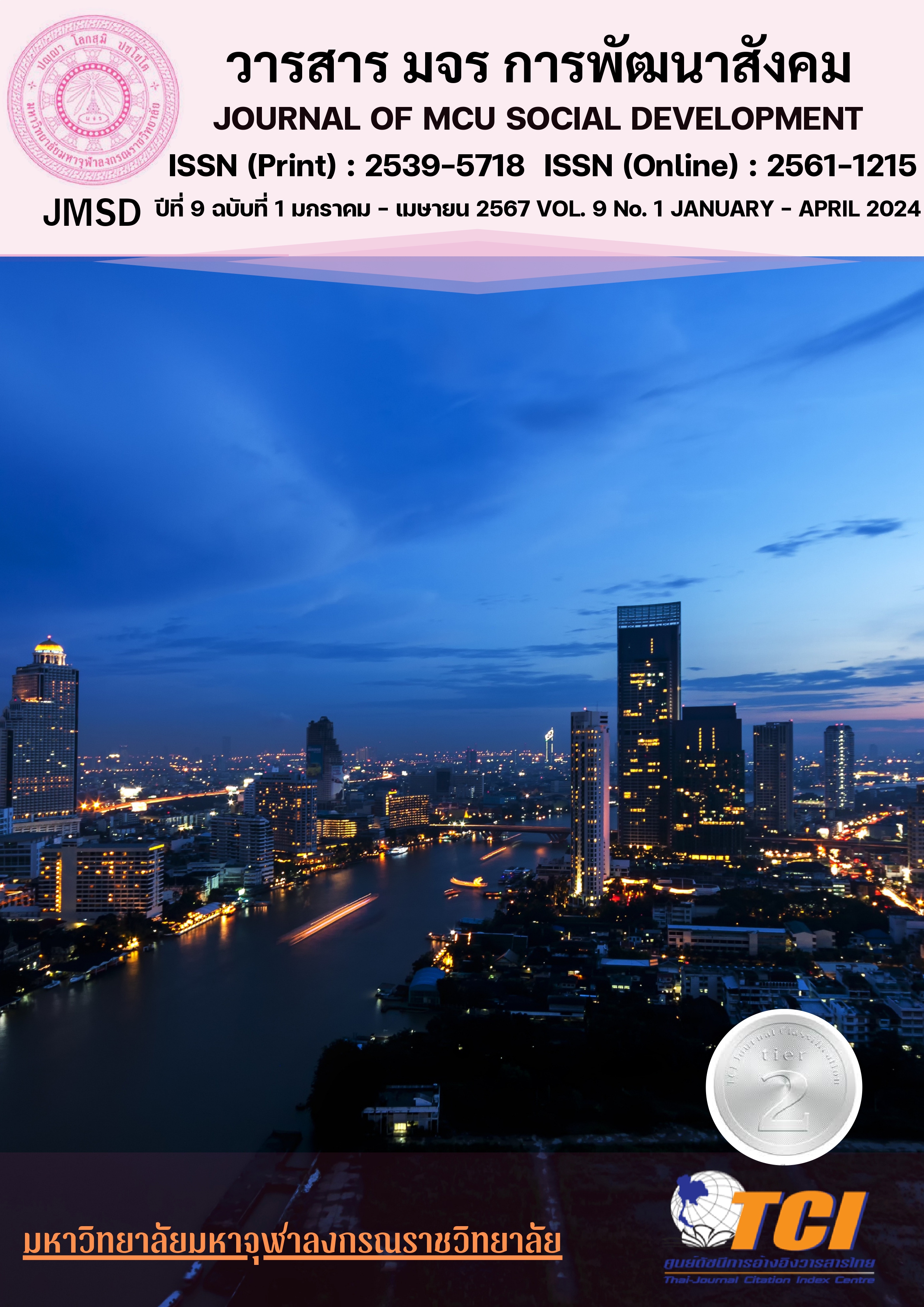Causal factors affecting the career success of tourism industry entrepreneurs in Thailand
คำสำคัญ:
Organizational management, Business development for success, Organizational development goals, Causal factors; Tourism industryบทคัดย่อ
This research aimed to analyze the influence of causal factors on an organization towards the success of the hospitality industry career by exploring Bangkok as a case study. The results of this research revealed that work strategy is found most influential on career success, followed by employee commitment to the organization, work competency, and demographic characteristics of employees, respectively. Upon overall consideration, every latent variable was able to describe a high variation in the career success of the employees. These findings further showed that the work strategy is critical to attain career success Therefore, such a factor shall be significantly observed in the organizational management in order to achieve the effective and sustainable development. In addition, all other variables were also found to affect the success of the hospitality industry careers, implying their co-driving force with work strategy for organizational development
เอกสารอ้างอิง
Akram, A. A. (2010). Modes of engagement: Migration, self-initiated expatriation, and career development. Career Development International, 15(4), 338-358.
Akrivos, C., Ladkin, A., and Reklitis, P. (2007). Hotel managers' career strategies for success. International Journal of Contemporary Hospitality Management, 19(2), 107-119.
Alizadeh, M., Jolai, F., Aminnayeri. M., and Rada, R. (2012) Comparison of different input selection algorithms in neuro-fuzzy modeling. Expert Syst Appl., 39, 1536–1544.
Ashby, J. S., and Schoon, I., (2010). Career success: The role of teenage career aspirations, ambition value and gender in predicting adult social status and earnings. Journal of Vocational Behavior, 77(3), 350-360.
Blickle, G., Oerder, K., and Summers, J. K. (2010). The impact of political skill on career success of employees' representatives. Journal of Vocational Behavior, 77(3), 383-390.
Department of Alternative Energy Development and Efficiency. Available online: http://www.dede.go.th/ewtadmin/ewt/dede_web/ewt_news.php?nid=47140 (last visited 5 October 2023).
Eddleston, K. A., Baldridge, D. C., and Veiga, J. F. (2004). Toward modeling the predictors of managerial career success: Does gender matter?. Journal of Managerial Psychology, 9(4), 360-385.
Grace, J. B. (2008). Structural equation modeling for observational studies. Journal of Wildlife Management, 72(1), 14-22.
Gruman, J. A., and Saks, A. M. (2011). Performance management and employee engagement. Human Resource Management Review, 21(2), 123-136.
Lindeman, R. H., Merenda, P. F., and Gold, R. Z. (1980), Introduction to bivariate and multivariate analysis. Glenview, IL: Scott, Foresman and company
National Statistic Office Ministry of Information and Communication Technology. Available online: http://web.nso.go.th/index.htm (last visited 5 October 2023).
Office of the National Economic and Social Development Council (NESDC). Available online: http://www.nesdb.go.th/nesdb_en/more_news.php?cid=154&filename=index (last visited 5 October 2023).
Richard, T., Xavier, F., Karen, C., Marianna, K. (2022). Tourism Supply Chains Report of a Desk Research Project for The Travel Foundation.
Sutthichaimethee, P, and Kubaha, K. (2018). The Efficiency of Long-Term Forecasting Model on Final Energy Consumption in Thailand’s Petroleum Industries Sector: Enriching the LT-ARIMAXS Model under a Sustainability Policy. Energies, 11(8), 2063.
Sutthichaimethee, P. (2016). Model of Environmental Problems Priority Arising from the Use of Environmental and Natural Resources in Machinery Sectors of Thailand. Environmental and Climate Technologies, 17(1), 18–29.
Sutthichaimethee, P., (2017). Varimax Model to Forecast the Emission of Carbon Dioxide from Energy Consumption in Rubber and Petroleum Industries Sectors in Thailand. Journal of Ecological Engineering. 18(3), 112–117.
Sutthichaimethee, P., and Ariyasajjakorn, D. (2017), The revised input-output table to determine total energy content and total greenhouse gas emission factors in Thailand. Journal of Ecological Engineering. 18(6), 66–170.
Sutthichaimethee, P., and Dockthaisong, B. (2018). A Relationship of Causal Factors in the Economic, Social, and Environmental Aspects Affecting the Implementation of Sustainability Policy in Thailand: Enriching the Path Analysis Based on a GMM Model. Resources, 7(4), 87.
Sutthichaimethee, P., Tanoamchard, W., Sawangwong, P., Pachana, P., and Witit-Anun, N. (2015). Environmental problems indicator under environmental modeling toward sustainable development. Global Journal of Environmental Science and Management (GJESM), 1(4), 325-332.
The World Bank: Energy Use (Kg of Oil Equivalent Per Capita) Home Page. Available online: https://data.worldbank.org/indicator/EG.USE.PCAP.KG.OE (last visited 1 October 2023).
Tourism Authority of Thailand. Available online: Province / Bangkok information. Available online: http://thai.tourismthailand.org. (last visited 5 October 2023)
Tsai, Y.-H. (2005). Quantifying Urban Form: Compactness versus 'Sprawl. Sage Journal, 42 (1), 141-161.
Vanderheijden, B. I. J. M., Delange, A. H., Demerouti, E., and Vander Heijde, C. M. (2009). Age effects on the employability’s career success relationship. Journal of Vocational Behavior, 74(2), 156-164.
Wu, D. D., Chen, S. H., and Olson, D. L. (2014). Business intelligence in risk management: Some recent progresses. Information Sciences, 25(6), 1-7.
Wu, S.C., Cao, Z.H., Li, Z.G., Cheung, K.C. and Wong, M.H. (2005). Effects of Biofertilizer Containing N-fixer, P and K Solubilizers and AM Fungi on Maize Growth: a Greenhouse Trial. Geoderma, 12(5), 155–166.
Yakin, M., and Erdil, O. (2012). Relationships between self-efficacy and work engagement and the effects on job satisfaction: A survey on certified public accountants. Procedia – Social and Behavioral Sciences, 58, 370 – 378.
Zakuan, N. M., Yusof, S. M., & Laosirihongthong, T. (2010). Total Quality Management & Business Excellence Proposed relationship of TQM and organisational performance using structured equation modelling. Total Quality Management, 21(2), 185-203.
Zhang, X; Song, H., Huang, G.Q. (2009). Tourism Management. 30(3), 345-358
ดาวน์โหลด
เผยแพร่แล้ว
รูปแบบการอ้างอิง
ฉบับ
ประเภทบทความ
สัญญาอนุญาต
ลิขสิทธิ์ (c) 2024 มจร การพัฒนาสังคม

อนุญาตภายใต้เงื่อนไข Creative Commons Attribution-NonCommercial-NoDerivatives 4.0 International License.



